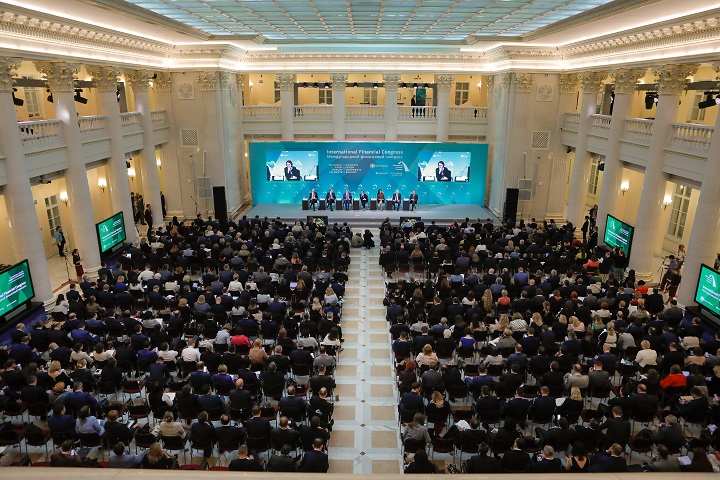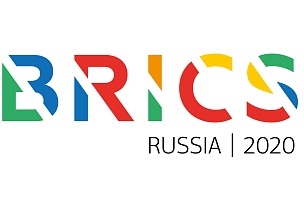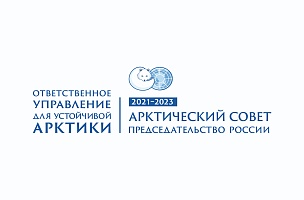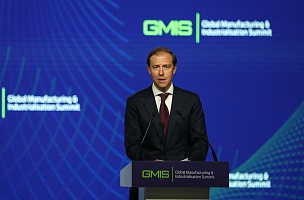The 27th International Financial Congress took place in St. Petersburg. The topic of the Congress is The Financial System: Stability for Growth.
«This topic is no coincidence. It’s been over ten years since the beginning of the financial crisis. However, we’re still unable to state that the global economy is back to sustainable growth and is capable of growing on its own without any stimulus measures. Naturally, this is a good enough reason to analyse what were the reasons behind such a long story. Was the cure efficient? It’s too early to make any conclusions. I think time will set things right,» Elvira Nabiullina, Governor of the Bank of Russia, explained the choice for the IFC topic.
Discussion of the contribution the financial system makes to the country’s economic development, as well as potential measures brought together over 1200 participants and media representatives from Russia and 41 other countries, including: Austria, Armenia, Belarus, Belgium, the UK, Hungary, Germany, Egypt, Israel, Iran, Spain, Italy, Kazakhstan, Canada, Cyprus, Kyrgyzstan, China, Luxemburg, Mauritius, Malaysia, Moldova, Mongolia, the Netherlands, the Bailiwick of Jersey, Poland, South Korea, Serbia, the USA, Tajikistan, Turkey, Uzbekistan, Finland, France, Montenegro, the Czech Republic, Switzerland, Sweden and Japan. The following countries had the biggest representation at the Congress: the USA, Kazakhstan and the UK.
Congress brought in representatives of the Bank of Russia, legislative and executive bodies, foreign regulators and international organizations, largest banks and financial companies, professional associations for financial market participants, as well as renowned Russian and international experts.
Participants of international sessions included: Svein Andresen, Former Secretary General, Financial Stability Board; Willem Buiter, Special Economic Advisor, Citigroup; Erik Berglof, Director, Institute of Global Affairs, London School of Economics and Political Science (LSE); Felix Wenger, Managing Partner, Zurich Office, McKinsey & Company; Marek Mora, Board Member, Czech National Bank; Ceyla Pazarbasioglu, Senior Director, World Bank; Jacob Frenkel, Chairman, JPMorgan Chase International; Marc Uzan, Executive Director, Reinventing Bretton Woods Committee; John Walsh, Partner, Financial Regulation Practice, McKinsey & Company, Washington D.C.; Alberto Fuertes, Economist, Central Bank of Spain; Max Hauser, Partner, Managing Director, The Boston Consulting Group; Paul P. Andrews, Secretary General, International Organization of Securities Commission (IOSCO) and others. Neighbouring countries were represented by Timur Zhaxylykov, Member of the Board (Minister) for Economy and Financial Policy, Eurasian Economic Commission; Daniyar Akishev, Governor, National Bank of Kazakhstan; Nurbek Jenish, Deputy Governor, National Bank of the Kyrgyz Republic; Sergey Kalechits, Deputy Chairman of the Board, National Bank of the Republic of Belarus and others.
Russian financial sector was represented by Elvira Nabiullina, Governor, the Bank of Russia; Anatoly Aksakov, Chairman, Committee on Financial Markets of the State Duma of the Federal Assembly of the Russian Federation; Chairman, Association of Russian Banks; Alexey Moiseev, Deputy Finance Minister of the Russian Federation; Pavel Medvedev, Financial Ombudsman; Herman Gref, Chief Executive Officer, Chairman of the Executive Board, Sberbank; Andrey Kostin, President and Chairman, VTB Bank; Ilya Polyakov, Chairman of the Management Board, ROSBANK; Georgy Luntovskiy, President, Association of Banks of Russia and others.
The Business Programme of the International Financial Congress 2018 offered a total of over 30 events in various formats: the plenary session, conferences, panel sessions, roundtables and discussion panels. The programme touched upon all the aspects of financial market. Participants focused on such topics as development of economy and finance, monetary policy, banking business, payment systems, retirement savings market, insurance, microfinancing, finance technologies, financial inclusion and literacy, etc.
The key event of 7 June, the first day of the Congress, was the plenary session called How does Regulation Affect Financial System Stability and Economic Growth? This discussion was dedicated to the changes in the financial sector regulation that occurred over the ten years since the last global financial crisis. In particular, participants addressed Basel III, macroprudential measures to ensure financial stability and the outlook for financial market under the regulation tightening trend.
In her address, Elvira Nabiullina, Governor of the Bank of Russia, described the current situation in the Russian financial market as stable and expressed her confidence in the long-term sustainability of both the financial market and its segments.
«Generally, we are quite confident in the long-term sustainability of the financial market and its segments, as well as in the fact that our regulation and supervision will be able to mitigate the potential risks of problem unfolding, should it occur in financial organizations or market segments,» said the Governor of the Bank of Russia. «Now, when the situation in the market is pretty stable and the rates are going down, it means that consumers, being in search of a higher yield, become more interested in tools other than the deposit. And we do see this interest. That’s why the financial market development policy should focus on the consumer, their interest, rights and excessive risk protection. Customer-oriented approach and trust must become, if you will, the ideology for the financial market development».
Elvira Nabiullina noted that over the next three years, the main areas for financial market development would list developing competition and financial inclusion, ensuring the atmosphere of trust in the financial market, as well as consumer rights protection.
«We want both people and companies to trust financial institutions. We will vigorously fight misselling, which brings consumers disappointment in financial market. For that purpose, we are creating conduct supervision to make sure people are not disappointed in entering the market with the products they purchased. We will also enhance the use of business reputation as an institute and raise management’s personal responsibility. Our next objective is to create an alternative mechanism to resolve disputes between consumers and financial organizations,» emphasized Ms. Nabiullina.
With that in mind, the International Financial Congress hosted the signing ceremony of the Memorandum of Understanding. The signees included banking associations and self-regulatory financial organizations (SRO). This Memorandum of Understanding addresses cooperation in fighting unscrupulous financial product sales practices in banking offices, as well as services of non-credit financial organizations. The Memorandum must become an efficient mechanism for the professional community and the Bank of Russia in their fight against misselling, when customers get insufficient information in the credit organization office and end up with investment expectations that don’t match the financial product or service they purchase.
Anatoly Aksakov, Chairman of the Committee on Financial Markets of the State Duma of the Federal Assembly of the Russian Federation and Chairman of the Association of Russian Banks, noted that the Bank of Russia went a long way to ensure the financial system recovery: «It’s stable, sustainable and profitable. It is important that financial institutions built up services on a healthy basis. At the same time, the regulator is expected to be skilful in applying regulation, ensuring scrupulosity of both participants of the financial market and banks without excessive regulatory pressure. As for legislation, in the nearest future we will adopt laws regulating digital financial assets, auditing, using insider information and insuring small business assets in banks, etc. Whereas I wholeheartedly support Ms. Nabiullina’s suggestion to insure assets exceeding 1.4 million roubles in certain cases, when people are virtually unable to manage risk of placing their assets in credit institutions. I would add socially important organizations (funds that support orphans, people with disabilities and multi-child families). In the nearest future, the State Duma is launching a discussion on the individual retirement capital concept and relative legislation. I expect the law on the individual retirement capital to be adopted by the end of the year,» pointed out Mr. Aksakov.
This day offered two more key plenary sessions. The first one — Birth Traumas and Acquired Illnesses in the Russian Banking System: On the Way to Recovery — was dedicated to developing banking sector in Russia, driving unscrupulous participants out of this sector, as well as ways to resolve the problems banks are still facing. The second one — How Economic Trends will Shape the Financial Sector — touched upon the performance of global and Russian economy, as well as long-term trends that will shape conditions for financial institutions over the next years.
Other events offered during the first day of the Congress addressed banking supervision and regulation, monetary policy, cybersecurity and developing the EAEU financial market, etc.
The second the day of the Congress, 8 June, mainly focused on developing competition in the financial sector. The plenary discussions — Competition on the Financial Market: Obstacles and Solutions and Three Development Strategies: Financial Market, Information Technologies and Financial Inclusion — were dedicated to finding common solutions between the regulator and the business community to ensure equal market conditions for market participants and to boost competition.
Other topics of the second day included: developing capital market, creating long-term money institutions, pressing insurance issues and personnel management in financial sector, etc.
On the final day of the International Financial Congress, the Bank of Russia and the Financial Services Commission of Mauritius signed a Memorandum of Understanding.
The starting day of the Congress, 6 June, hosted nine events, which included: the 16th International Conference of the All-Russian Insurance Association: In Search of Growth Areas. Development Strategy; Bank of Russia Research Conference: Inflation: New Insights for Central Banks; Conference: Current Issues in Microfinance; four roundtables — Current Issues in Asset Management Regulation; Conduct Supervision, from Concept to Practice: Agency Schemes for Selling Financial Products; Bonds and Other Financial Tools and Capital Market Mechanisms for Funding Infrastructure Projects; What Should the Pension System of the Russian Federation Look Like? Key Issues; as well as a discussion panel called Strengthening the Rationality and Integrity of Financial Organization Directors: A Toolset and the Meeting of the Committee of Russian National SWIFT Association (ROSSWIFT). Prior to the Congress, St. Petersburg hosted the 2nd Summer Macroeconomic School for graduate and post-graduate students, as well as young educators.
The Congress organized an exhibition that presented the stands of VTB Bank, Mir National Payment System, Russian Agricultural Bank, Moscow Exchange, Rostelecom, JSC SME Bank, Goznak, FinCERT, Fintech Association and ROSINKAS (Russian Association of Cash-in-Transit).
The Presentation Area, an additional networking platform, was open on 7–8 June. It’s a new service that offered participants new financial products and services presentations, as well as business meetings and events. Visitors had a chance to learn about financial sector development trends, their colleagues’ recommendations, as well as technological novelties that can reshape the industry in the coming years. The two-days programme included the following presentations: RuData presentation: a new system to assess the price, liquidity and trading activity of Russian bonds based on Interfax, NSD Price Centre and Thomson Reuters data; presentation of the prototype and pilot version of the ‘Marketplace’ project; presentation by Rostelecom: Demonstration of remote biometric identification via Pochta Bank; the Bank of Russia’s analytical report ‘Outcomes of the post crisis decade in Russia’s banking sector: The main trends and challenges’; presentation of the analytical report of the Bank of Russia with the participation of the FAS Russia ‘Competition in the financial market’; and report by the Centre for Macroeconomic Analysis and Short-Term Forecasting ‘Search for Optimal Depth and Structure of the Financial Sector from the Perspective of Economic Growth and Macroeconomic Stability’. Additionally the programme offered the following presentation sessions: a mobile app called Banknotes of the Bank of Russia; Financial education: The role of market players; XBRL: First results of statements collection. Further steps. The Congress hosted the following signing ceremonies: Cooperation Agreement in the field of information security between the Bank of Russia and the National Bank of Kazakhstan; Agreement on Cooperation and Information Exchange in the field of financial market supervision between the Bank of Russia and the National bank of Kazakhstan.
The IFC 2018 mobile app was developed to provide updated information on the programme and services of the Congress. Participants could also take part in interactive surveys through the app.
The Cultural Programme of the IFC 2018 organized the concert of the Mariinsky Theatre Symphony Orchestra conducted by Valery Gergiev and a traditional reception on behalf of the Bank of Russia.
For the first time, the IFC programme offered sporting events. Konstantin Bobrov, Chairman of Uralsib Bank, and Gennady Vetrov, CEO and Chairman of the Management Board of Energomashbank, as well as other financial organizations top managers took part in the Roscongress Cup squash and billiards (Free Pyramid) tournaments. Participants of the squash tournament also had a chance to watch an exhibition match between Roman Fetisov, the Champion of Russia, and David Clegg, one of Australia’s top players. Roman Fetisov won the game.
13 companies had the status of IFC 2018 Partner.
General Sponsor: VTB Bank.
General Partners: AHML, Sberbank, Mir National Payment System, Russian Agricultural Bank, Moscow Exchange.
Telecommunications Partner: Rostelecom.
Exhibition partners: JSC SME Bank, Russian National Reinsurance Company, Goznak, FinCERT, ROSINKAS Association.
Media partners included 15 Russian and international companies.
General Media Partners: Thomson Reuters; Rossiyskaya Gazeta FSBI Editorial; Vedomosti Business Daily; Interfax Information Services Group.
Media partners: Izvestia MIC; Russia 24 Russian Information channel; Modern Insurance Technology journal; Banking Review journal; Financial One journal; Banking Technologies journal; Insurance Today RBC PJSC; Banki.ru; Prime Business News Agency JSC; Cbonds.
Organizers of the International Financial Congress: the Bank of Russia and the Roscongress Foundation.
Transcripts and videos of the IFC Business Programme will uploaded to the official website of the Congress at the end of June.






